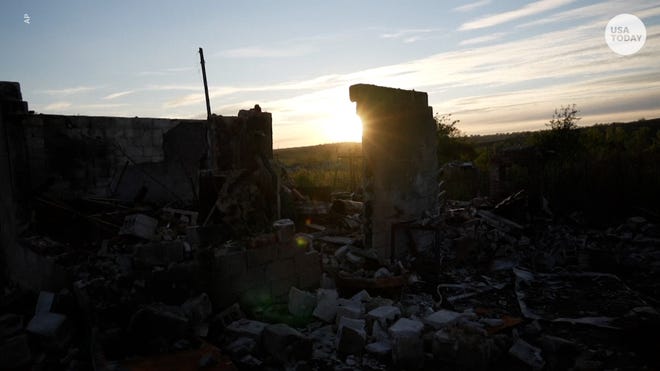Russia has “shamelessly” violated core tenets of the United Nations and the world must stand behind Ukraine as it attempts to fend off Russia’s brutal invasion, President Joe Biden said Wednesday.
Russia’s attacks on schools, hospitals and rail stations “should make your blood run cold,” he said.
Biden, speaking before the U.N. General Assembly in New York, said Russian President Vladimir Putin is “pumping out lies” by blaming the West for the war he started. If Russia or any nation can pursue their imperialist ambitions without consequences “we put at risk everything this institution stands for,” he said.
“You cannot seize a nation’s territory by force,” Biden said. “The only country standing in the way of that is Russia, so we, each of us in this body … must be clear, firm and unwavering in our resolve. Ukraine has the same rights that belong to every sovereign nation. We will stand in solidarity with Ukraine. We will stand in solidarity against Russia’s aggression, period.”
Putin announces ‘partial’ military mobilization
Putin announced a partial military mobilization in a televised address to his nation Wednesday as Ukraine’s counteroffensive continued to push his invasion troops back toward the Russian border.
Putin’s plan, which starts by calling up reservists who previously served in the army, was unveiled hours after Russian-controlled regions in eastern and southern Ukraine announced plans to hold votes on becoming permanent parts of Russia.
Defense Minister Sergey Shoigu said 300,000 people – a little more than 1% of the 25 million reserves who fit the description – would be called up for military service.
Putin had previously avoided the callups in his effort to minimize the effects of the war – a term he rejects in favor of “special military operation” – on the Russian population. But the conflict he had hoped would be completed in weeks has dragged on for seven months with little sign of ending soon.
He blamed the escalation on the West, telling his people the U.S. and its allies were attempting to break Russia “into an array of fatally warring regions and areas.”
Recent developments:
►Britain is sending Ukraine $500 million through the World Bank to help it purchase more natural gas, British Prime Minister Liz Truss said. Ukraine already has stored enough for about six months.
►Russian proxies in Donetsk province, part of the Donbas region that Russia seeks to claim, have conscripted up to 500 steel plant workers in Donetsk, essentially shutting down two steel plants, Ukraine officials said.
TURNING POINT IN THE WAR?As Russia admits defeat in Kharkiv, Ukraine regains land, confidence
What is partial mobilization?
Putin said the partial mobilization means only Russians who are currently in the reserve will be subject to conscription. Initially those brought back into the military will include specialists and others with “relevant experience,” Putin said.
He said that would be enough to overcome “the threats we face, namely to protect our homeland, its sovereignty and territorial integrity, to ensure the security of our people and people in the liberated territories.”
‘NUCLEAR TERRORISM’:Ukraine warns of Russia’s actions after strike near plant
Did Putin threaten nuclear war?
Putin accused the West of nuclear blackmail, blaming Ukraine and its allies for the bombardments near the Zaporizhzhia nuclear power plant. Ukraine has blamed Russia for the bombings, which international regulators warn could trigger a nuclear disaster. Putin also accused leading NATO countries of suggesting that nuclear weapons could be used against Russia.
“I want to remind you that our country also has various means of destruction, and … to protect Russia and our people, we will certainly use all the means at our disposal,” Putin said. “It’s not a bluff.”
THE WAR IN REVIEW:The week in Ukraine’s war with Russia, including key events explained in 5 graphics
Democratic youth movement in Russia protests war
Russia’s Vesna democratic youth movement called for protests across the nation in response to Putin’s escalation of the war. The group urged frontline military units to refuse to participate in the ‘special operation’ or surrender as soon as possible. The website, difficult to reach from the U.S, provides a hotline for soldiers looking for a way out.
“You don’t have to die for Putin,” the group said in a statement. “You are needed in Russia by those who love you. For the authorities, you are just cannon fodder, where you will be squandered without any meaning or purpose.”
When will the referendum voting take place?
The referendum voting will start Friday in the Luhansk, Kherson and partly Russian-controlled Zaporizhzhia and Donetsk regions. Referendums have been discussed for weeks, but voting had not been expected until November. Ukraine’s military gains likely compelled the Kremlin to move up the voting as an excuse to step up its military effort in those regions.
Former President Dmitry Medvedev, the deputy head of Russia’s Security Council chaired by Putin, said successful referendums would result in “irreversible” redrawn frontiers. Moscow, he warned, could use “any means” to defend them.
Ukrainian President Volodymyr Zelenskyy dismissed the voting as “noise” and thanked Ukraine’s allies for condemning the votes. U.S. national security adviser Jake Sullivan said Russia would manipulate “sham” results to annex the land.
“Let me be clear, if this does transpire, the United States will never recognize Russia’s claims to any purportedly annexed parts of Ukraine,” Sullivan said.
After voting, talks will be ‘impossible,’ Russian lawmaker says
Any prospects for talks with Ukraine after the Donbas region votes to join Russia will be impossible, the Russian lower parliament’s Foreign Affairs Committee chairman said. Leonid Slutsky said the negotiation process had passed the point of no return.
“Kiev politicians said earlier that surrender was the only possible development” that could end the fighting, said. “We were ready for talks, but Kiev violated all the agreements.”
Russia cracking down on deserters
Russia’s lower of house of parliament voted this week to toughen laws against desertion, surrender and looting by Russian troops. Lawmakers also voted to introduce possible 10-year prison terms for soldiers refusing to fight. The laws are expected to win approval of the upper house and Putin.





